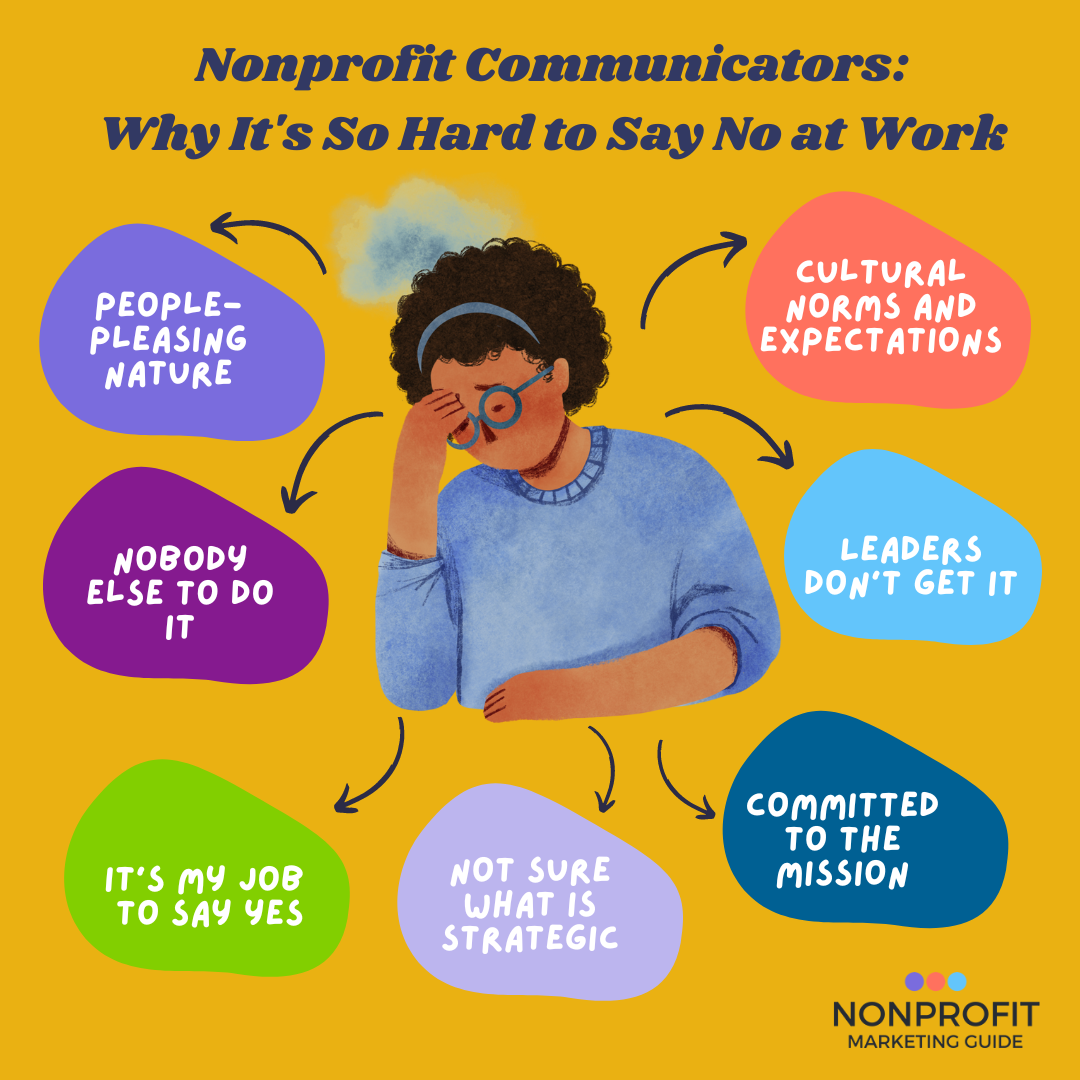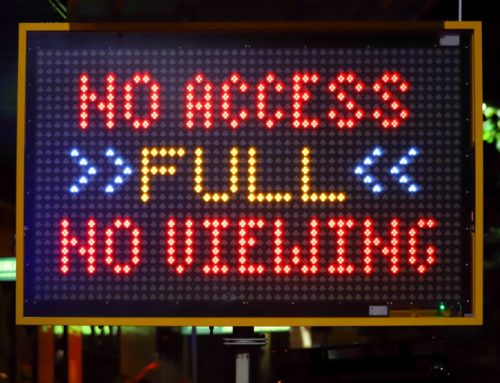
If you have difficulty saying No to your supervisor or colleagues as a nonprofit communicator, you are not alone.
Three-quarters (74% of survey participants for the 2023 Nonprofit Communications Trends Report) said it was difficult or very difficult to say No to their supervisors when they make a work request. It’s only slightly easier to say No to work requests from colleagues in other departments, with 65% saying it was difficult or very difficult.
We wrote last month about why nonprofit communicators need the ability to say no at work (conclusions, capacity, conflict, confusion).
Today, let’s look at why it is so hard for nonprofit communicators to say No, in their own words.
We found seven reasons why in their Trends Report survey responses. All the examples are exact words from survey participants.
1. People-Pleasing Nature
“I personally have a hard time saying no. I place a great deal of self-worth on my productivity and ‘usefulness’ in a workplace.”
“I just simply never learned to say no in any situation, work-related or not.”
“Personally, I struggle with setting boundaries when there is a need. I am currently working on this, but I have a long way to go since it has been my M.O. throughout my career.”
2. Organizational Cultural Norms and Expectations
Just about the same number of “people pleasers” pegged organizational cultural norms and expectations as the culprit. It’s important to note that this was the top concern for people who said it was “very difficult” to say No to a supervisor – again the people most likely to be searching for new employment this year.
“Our office culture places high emphasis on hierarchy, taking on work outside the scope of responsibilities, and always saying yes to our nonprofit’s leadership.”
“I’ve received feedback that if I say no to requests, it makes me unapproachable and a poor team player. The rest of the staff are Program Managers, and since they are the ‘feet on the ground’ their requests and needs are often immediate/emergency, which takes priority over my precisely planned project timelines.”
“In the case of a coworker asking me to complete a task, it is unlikely my boss will have my back if I say my workload is already too high. Similarly, my boss is likely to say my work ethic is unprofessional if I decline to take on additional work from her. This is one of many reasons I am seeking new employment in 2023.”
3. If I Don’t Do It, Nobody Will
While People-Pleasing and Organizational Culture were by far the top two responses, the next most common reasons were “if I don’t do it, nobody will” and “a lack of understanding about the strategic value of communications work.”
“Because if I don’t do it, it won’t get done. And sometimes my coworkers are coming to me because they’re stuck, feeling helpless, or under a serious deadline that would benefit/harm the larger organization.”
“I am the only person who can help with communications-related requests.”
“Because we have limited staff so if I don’t do it and it’s important, it might not get done.”
Most of these answers were expressed by communications team of 1.5 FTE or less.
4. Lack of Understanding About the Strategic Value of Communications Work
Related to the organizational culture response is how others in the organization, from leadership on down, perceive the role of communications.
“Everyone is an expert about marketing and has ideas about what should be done.”
“People who aren’t communicators or marketers often think they have great ideas that really aren’t and it’s hard to dissuade them.”
“Our executive director considers us a ‘concierge service’ for our ‘clients’ (colleagues) and strongly discourages ever saying no, which obviously hurts our ability to work strategically and serenely.”
The larger the team, the less this reason was cited. It’s also important to note that this reason for not being able to say No was the top explanation for those saying it is “very difficult” to say No to colleagues.
5. It’s My Job
Akin to the “if I don’t do it, nobody will” response, a smaller group, most working in teams of 1.5 FTE or less, simply said it’s their job to do the requested work.
“Because my job description indicates that I need to respond to requests.”
“I see it as my job to support the team.”
“Expectation is anything that is asked of you is your job. When you decline something that is asked of you, you are not doing your job.”
6. Because I Am Committed to the Mission
Finally, about a dozen people listed two other reasons: commitment to the mission and lack of strategy.
“The work goes beyond me and tends to relate to sharing something to the greater community.”
“Small teams, big needs, use of mission to guilt.”
“Because I want to further the mission of the org and don’t want to let them down.”
7. Not Knowing What Is Strategic and What Isn’t
“Lack of strategy from the top to better define priorities.”
“My manager doesn’t have a priority action plan for myself or the team. Everything is important all the time.”





